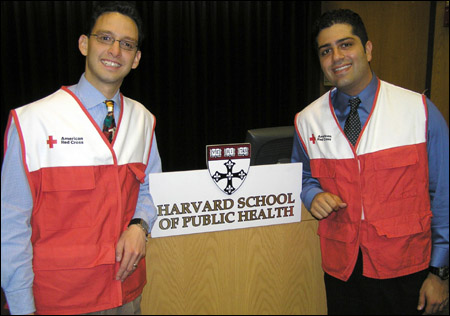Doctors take their place on front lines

Many stories and images are engraved in Christian Arbelaez’s memory from the 12 days he spent as a volunteer working with people who had been driven into shelters by Hurricane Katrina, but a few stand out in high relief.
Like the elderly couple that rescue workers plucked from the roof of their home as the waters rose around them. What Arbelaez remembers most about them are their smiles.
Related links:
• Katrina continues to stir Harvard community into action
• On the ground in Baton Rouge
• Learn more about what is happening at Harvard regarding the aftermath of Katrina
Deadline for Harvard donation match (up to $100): Oct. 15
“They were the happiest people I’ve ever seen. They were just thankful to be alive. Experiences like that are very powerful. They make you realize how important basic needs really are.”
Arbelaez is an instructor in medicine at Harvard Medical School and an attending physician in emergency medicine at Brigham and Women’s Hospital (BWH). For a week in mid-September he worked as part of a multidisciplinary team from BWH to provide immediate care and conduct rapid health assessments of New Orleans-area shelters.
Arbelaez, who has a degree from the Harvard School of Public Health (SPH) in addition to a medical degree, worked mostly with people from the Ninth Ward and St. Bernard Parish, two of the poorest and worst-hit areas of the city. These were people who, for the most part, did not have a chance to evacuate because they had no cars and nowhere to go, Arbelaez said.
Arbelaez’s job was to monitor shelters, assess their needs, educate health providers, and keep tabs on the spread of disease among the shelter populations. When needed, he also provided clinical care. The experience, he said, was life changing.
“After Katrina, only one thing mattered to me – how was I going to apply the tools I had acquired from the School of Public Health, how was I going to do something right now? This gave me the opportunity to do that.”
For Barsam Kasravi, the experience of working with Katrina survivors was life changing as well. Kasravi, an associate physician at BWH and at Children’s Hospital and a 2004-05 graduate of SPH, was in New Orleans from Sept. 21-28, working mostly in shelters in the northeastern part of the state where many Gulf Coast residents ended up after Hurricane Rita delivered a second blow to the area.
“I realized that the public health skills I’ve learned in an academic setting can be applied in a real-life situation to benefit people, and this was very rewarding. It was also wonderful to be working with all these other volunteers who all felt the same passion to help.”
Both Arbelaez and Kasravi were struck by the vulnerability of the populations they served and the disparity in health services between different economic levels.
“The most common thing I saw,” said Kasravi, “was that poor people with chronic medical conditions like diabetes, heart disease, stroke, high blood pressure, were subject to disruptions in the continuity of care. Often their records weren’t computerized and they didn’t have physicians to do follow-up work, to make sure they got their medications.”
Arbelaez agrees.
“What I learned is that people get left behind. We need to talk about racism, about poverty, about how to better serve communities such as these.”




